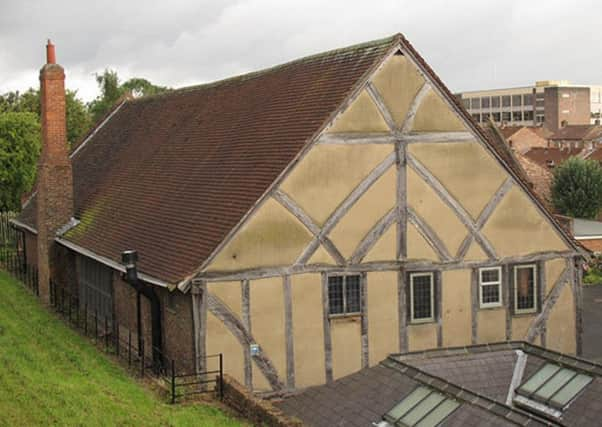Nostalgia: Theatre in the provinces


As early as 1572, James Burbage, the founder of the modern theatre, received a licence from the Lord Privy Seal for himself and three other servants of the earl of Leicester “to use, exercise and occupy the art and faculty of playing comedies, tragedies, interludes and stage-plays”. That year Lord Leicester’s men played in Doncaster church for a fee of 20 shillings. In 1581, there were travelling players at York, licensed by the Lord Mayor of the city; and in 1589 there were performances by them in the Minster Yard, the Common Hall and the Merchant Taylors’ Hall. At this time, York was also visited by players belonging to the Earl of Essex, Lords Sussex and Stafford and even the Queen, who had her own company.
Hull seems to have been less friendly: the mayor there denounced “divers lewd persons, players and setters out of plays” and those who attended their performances were fined. In 1598, “interludes” were banned there for “debauching” young people. But for its Puritan intolerance, Hull was exceptional: we know that Sheffield and Beverley as well as York welcomed “strolling players” who performed traditional dramas such as St George and the Dragon and Robin Hood.
Advertisement
Hide AdAdvertisement
Hide AdHowever, unlicensed groups of players were suspected by the Protestant authorities of promoting Catholic propaganda and these were particularly numerous and active in the North Riding.
The first written reference to the Egton players who toured the north-east corner of the county comes from 1595. At that time they were performing interludes in the households of several recusant gentry. In 1616, Sir Thomas Posthumous Hoby of Hackness, a notorious hunter of Catholics, complained of “Popish plays” in his locality and accused the Cholmleys of Abbey House, Whitby, of patronising and entertaining them at Sneaton and Roxby castle. Some of the players were named and came from Egton and others from Staithes, Hutton Buscel, Allerston and Goathland. Six years later, this same company was fined heavily by the North Riding bench of justices.
None of these players were educated men and it has been suggested that they were instructed by missionary priests imported from Douai in the Spanish Netherlands. If the Egton players survived beyond 1616 there is no surviving evidence of their activity, though the township’s 126 Catholics in the 1620s had grown to 138 by 1642. However, as long as Thomas Hoby was alive and in pursuit it was far too dangerous to act out anti-Protestant interludes, even in the privacy of gentry homes.
One of these suspect gentlemen was Richard Cholmley of Brandsby, whose Memorandum Book covering the years 1602 to 1623 provides plenty of illustration of the physical and financial penalties endured by those, like him, who stubbornly stuck to the old faith. Imprisoned briefly and painfully in York castle, forced to pay a huge bribe to escape a trial for a capital felony, Richard was constantly on the move to evade constables, creditors and demands for swingeing recusancy fines. In 1616 he was one of the nine Yorkshiremen who were fined for entertaining “players of interludes” from Hutton Buscel and Wilton in their houses.
Advertisement
Hide AdAdvertisement
Hide AdSir Richard Cholmley of Whitby, cousin of the Brandsby Cholmleys, had conformed to the established Protestant church rather than face charges of treason, but two references to him in his son’s family memoirs offer examples of theatre in Shakespeare’s time.
According to Sir Hugh Cholmley’s memory, his father was tall “but slender and well shaped”. As such he was chosen to play “the part of a woeman in a commodedy [comedy] at Trinity collidge in Cambridge”. At that time Richard would have been about 15 years old in 1595, still beardless and “beautifull” enough to appear female.
Later, in 1603, when Sir Richard was about 23 years old, he was in London to see “a play at Black Friers”. Coming in late to the performance, he had to hire a stool to sit at a corner of the stage. As was the custom then, during an interval between scenes, he had “stood up to refresh him selfe”, only to find on his return that “a young Gallant” had “clapped him selfe upon his stoole”. Naturally, Sir Richard refused to tolerate such impertinence and invited the “gallant” outside. Disappointed that the gallant did not possess a rapier to defend himself in a sword duel, Sir Richard had to settle for a fisticuff lesson: so he gave him “two or 3 gud blowes” before he ran off. For their own welfare, Londoners should not take liberties with Yorkshiremen.
William Shakespeare himself had once been a boy actor in the household of a Lancastrian Catholic family, the Heskeths of Rufford Old Hall, but fortunately for him and the whole world since, he had decided not to become one of the religious victims of the Protestant regimes of Queen Elizabeth or King James I. We must be grateful that he did not suffer the fate of Nicholas Poskett, a boy player from Egton, who later died as a priest martyr.